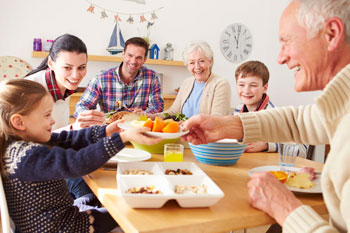Coping with Cancer During the Holidays

The holidays bring celebration, tradition, and joy, but also obligation and expectation. This season can be stressful under the best circumstances, but add a cancer diagnosis or treatment into the mix, and the weight can become unbearable. If you or someone you love is navigating the merriment of the holidays with this extra burden, here are a few tips to make it more manageable and keep it the most wonderful time of the year for your family.
Different Traditions Doesn’t Mean Less Joy
You may be reluctant to admit that things are different this year. People expect certain things from you – a large get-together, elaborate meals, extensive decorating, multiple shopping trips – and you don’t want to disappoint others or yourself. But it’s important to acknowledge that roles may need to shift this year in order enjoy your time to the fullest. A few things to consider:
- Physical limitation: If you are undergoing treatment or have just finished, your body may not be up for long days and hard work. Your tastes will be different during this time and nausea may keep you from enjoying all your traditional favorites.
- Emotional changes: The holidays can bring emotions to the forefront anyway, but anxiety over the uncertainty of your future may lead depression or pressuring yourself into perfection. Instead, try expressing your feelings and thankfulness to the people around you.
- Financial Weight: The cost of treatment, prescriptions, and time away from work may change your holiday budget significantly, but there are many alternatives to make some things remain special.
Redesign the Expectations
Having acknowledged things are different this year, now you can plan how to get the most enjoyment out of the holiday season while still taking care of yourself.
- Prioritize yourself: Take the pressure off. You may feel obligated to say yes to every invitation, but you shouldn’t. Know your physical limitations and take care of yourself. Rest when necessary, and don’t overindulge in holiday foods or alcoholic beverages. They will deplete your energy, and you may end up feeling worse.
- Adjust your traditions: Decide which holiday traditions are most important, and restructure them to make them work for you. If you still want to host a holiday get together, think about ordering food from a local restaurant and enlist the help of others for cleaning and decorating. Set a holiday budget and do your shopping online. These changes will allow you to enjoy without becoming overwhelmed.
- Cherish the moment: Focus on the new traditions and the people you are surrounded by rather than how a diagnosis or treatment has changed from previous years. And if you can’t make it to every occasion, video chatting on phones and computers can be a great way to still be together throughout the season.
- Surround yourself with support: Don’t close yourself off from relationships—be honest and communicate what you need physically and emotionally. Talking through your fears and emotions are most important. It’s OK to let yourself cry and laugh. Find a partner to share this burden who can help shape the holidays into the most enjoyable it can be.
Loving Someone with Cancer during the Holidays
Taking care of someone with cancer during the holidays can be just as difficult to navigate when dealing with your own emotions and fears while trying to make the best holiday experience for your loved one. Here are few things to keep in mind:
- Discuss expectations of the holiday season: Be honest and understanding when discussing what kind of holiday experiences are important. See where you can help them manage expectations to make a reality and modify activities and help when needed.
- Take the pressure off: Continue extending invitations and making plans, but allow and assist your loved one in finding the balance between isolation and obligation by discussing the holiday schedule.
- Allow room for contribution: It’s important for the patient to feel a sense of normalcy when possible. Continuing to participate in holiday activities can be an important way to cope with cancer cope during the holidays. Gauge their expectations and find ways to help facilitate their contributions.
- Recognize when you or your loved one needs support: Listen and acknowledge their needs and emotions. Let them know they are not alone, and know when to ask for help. There are many resources available for patients and caregivers, so speak with your loved one’s physician to get the supportive help you need.
References: http://www.cancer.org/cancer/news/features/cancer-during-the-holidays
https://www.roswellpark.org/cancertalk/201212/coping-cancer-during-holidays
 Srujitha Murukutla, MD, is a medical oncologist at Tunnell Cancer Center. She has authored several publications with emphasis on breast cancer research. She is Board Certified in Internal Medicine. Additionally, she is a member of American Society of Clinical Oncology and also American Society of Hematology. Find out more about Tunnell Cancer Center: https://www.beebehealthcare.org/tunnell-cancer-center
Srujitha Murukutla, MD, is a medical oncologist at Tunnell Cancer Center. She has authored several publications with emphasis on breast cancer research. She is Board Certified in Internal Medicine. Additionally, she is a member of American Society of Clinical Oncology and also American Society of Hematology. Find out more about Tunnell Cancer Center: https://www.beebehealthcare.org/tunnell-cancer-center
